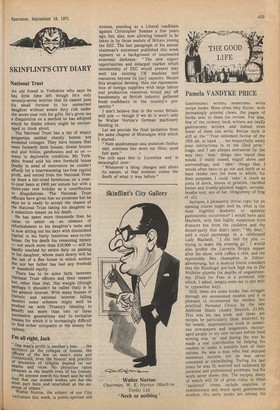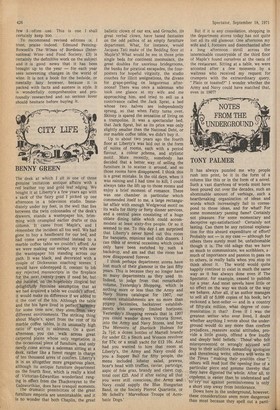Pamela VANDYKE PRICE
Gastronomic writers sometimes write recipe books. More often they flutter, with increasingly pointed claws, the pages of books sent to them for review. For alas, few of the cookery book writers are really gastronomic writers, and indeed even fewer of them can write. Recipe style is still at the " Your esteemed favour of the 15th ult. to hand . . . we respectfully await your instructions in re the 22nd prox."
stage, and I am always entranced by the way they ' toss' things into liquid that would, if really tossed, engulf stove and surroundings, and ' take ' things that I would often have to go out and fetch or at least render into the form in which, for
their purposes, I could ' take ' it (such as pints of stock, leaves of gelatine, clarified butter and freshly-plucked haggis, cervelat boudin noir, eye of bat, thingummy of frog et al.).
Apropos, a pleasantly trivial topic for an opening course might well be, what is the most frightful dramatic or operatic gastronomic occurrence? I would have said Macbeth, with that highly suspicious hors d'oeuvre hot from the cauldron and the dinner-party that didn't later; " My dear," said a royal personage to a celebrated Lady Macbeth, " I did feel for you — trying to make the evening go." I would also proffer the Lucrezia Borgia supper after the show, with coffins A cOte, and the
regrettable fete champetre in Glitterdtimmerung, but a musical friend considers that the Hundings' pot-luck high tea in Die Wa/Kire plumbs the depths of ungastronomy. (Food for Foes is a potential title which, I admit, tempts even me to put mitt to typewriter key). Still, there are some books that struggle through my envenomed meshes and it is pleasant to recommend the modest but practical Personal Choice by the late Ambrose Heath (Andre Deutsch, £1.60). This was his last book and these are recipes he particularly liked. Ambrot,e, by his steady, unpretentious work in numerous newspapers and magazines, encouraged people to try new recipes before food writing was ' in ' and during the war he made a real contribution by helping his readers to make a sensible best of their rations. He was a man who had enjoyed enormous success, but he was never conceited or intimidating. During his last years he was ill, worried and saddened by
personal and professional problems, but his work never shows this. The recipes, many of which will be of great value in these ' squeezed' times, include snatches of reminiscence and much quiet gastronomic wisdom. His early books are among the few L often use. This is one I shall certainly keep too.
To recommend revised editions is, I trust, praise indeed. Edmund PenningRowse11's The Wines of Bordeaux (International Wine and Food Society, £3) is certainly the definitive work on the subject and it is good news that it has been brought up to the year — for each year sees interesting changes in the world of wine. It is not a book for the bedside, or mentally lazy browser, because it is packed with facts and austere in style. It is wonderfully comprehensive and profoundly researched and no serious lover should hesitate before buying it.



































 Previous page
Previous page